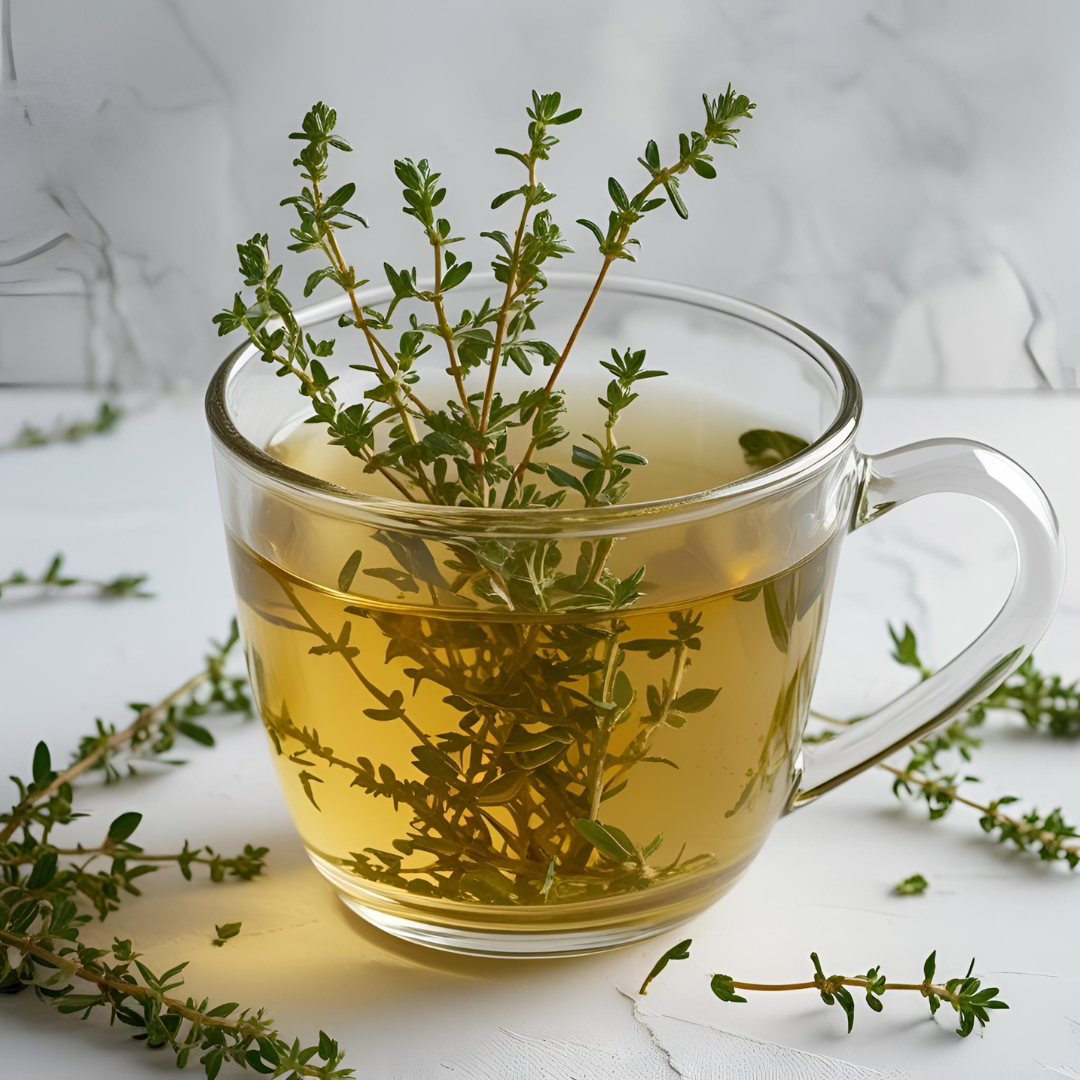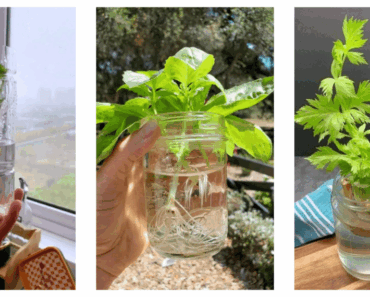Thyme (Thymus vulgaris) is rich in bioactive compounds such as thymol and carvacrol, which give the herb its distinctive aroma and potent medicinal qualities. These compounds are responsible for thyme’s antimicrobial, antiviral, anti-inflammatory, and antioxidant effects123. When steeped in hot water, thyme releases these beneficial compounds, creating a tea that can support both immune and respiratory health.
Strep throat is caused by the bacterium Streptococcus pyogenes, which leads to painful inflammation and infection of the throat. Thyme tea has shown significant antibacterial activity against Streptococcus species. Research demonstrates that hot water infusions of thyme can inhibit the growth and biofilm formation of S. pyogenes, helping manage and potentially shorten the duration of strep throat infections42.
:
-
disrupt bacterial cell walls and inhibit bacterial growth.
-
Thyme’s antimicrobial properties can help reduce the bacterial load in the throat, offering relief from pain and inflammation23.
:
Gargling with cooled thyme tea or sipping it warm can help soothe a sore throat and may aid in fighting the underlying infection2.
Influenza, or the flu, is a viral respiratory infection that can cause fever, cough, sore throat, and fatigue. Laboratory studies have shown that thyme extract exhibits antiviral activity against the influenza virus, reducing the virus’s ability to infect cells and lessening the damage it causes52.
:
-
The essential oils in thyme, especially thymol, can inactivate certain viruses, including influenza, by disrupting their outer membranes and interfering with their replication5.
-
Thyme’s antioxidant properties help reduce oxidative stress and inflammation caused by viral infections62.
:
Drinking thyme tea during the flu may help alleviate symptoms, reduce cough, and support the body’s natural defenses23.
Respiratory infections, including bronchitis and the common cold, often involve persistent coughing, congestion, and inflammation. Thyme tea acts as a natural expectorant, helping to loosen and expel mucus from the airways763. Its anti-inflammatory effects soothe irritated tissues, making breathing easier and reducing cough frequency.
:
A clinical trial found that a combination of thyme and ivy leaf extracts significantly reduced coughing fits and improved symptoms in adults with acute bronchitis, with a rapid and well-tolerated effect8. Thyme’s expectorant action helps clear phlegm, while its anti-inflammatory compounds calm the respiratory tract63.
Thyme tea is rich in antioxidants, which help protect cells from damage and support the immune system693. Regular consumption may reduce the risk of infections and speed recovery during illness.
-
: Combat oxidative stress and inflammation.
-
: Compounds in thyme help regulate immune responses, making the body more resilient to pathogens65.
Making thyme tea at home is simple and requires only a few ingredients:
:
-
1 tablespoon fresh thyme leaves (or 1 teaspoon dried thyme)
-
1 cup boiling water
-
Honey (optional, for sweetness)
-
Lemon slices (optional, for extra vitamin C and flavor)
:
-
Place the thyme leaves in a teapot or heatproof cup.
-
Pour boiling water over the leaves.
-
Cover and steep for 5–10 minutes to extract the essential oils and active compounds7109.
-
Strain and pour into a cup.
-
Add honey and lemon if desired.
:
Sip the tea while warm for maximum soothing benefits. For sore throats, try gargling with cooled thyme tea several times a day2.
-
: Drink or gargle with thyme tea up to three times daily2.
-
: Drink a cup of thyme tea at the onset of symptoms and continue as needed for relief92.
-
: Combine thyme tea with other expectorant herbs, such as ivy or licorice, for enhanced effect84.
-
Thyme essential oil and tea have demonstrated strong antibacterial activity against multidrug-resistant clinical strains, including those causing respiratory and throat infections51142.
-
Thyme extract has shown antiviral effects against influenza and herpes simplex viruses, and research suggests potential activity against coronaviruses5.
-
A randomized controlled trial found thyme-ivy extract superior to placebo for reducing cough and improving bronchitis symptoms, with a good safety profile8.
-
Hot water infusions of thyme, licorice, and oregano were effective in inhibiting S. pyogenes (strep throat) in laboratory studies4.
While thyme tea is generally safe for most adults when consumed in moderation, there are some important precautions:
-
: Some individuals may be allergic to thyme or related herbs, resulting in skin rashes, gastrointestinal upset, or respiratory symptoms121.
-
: Excessive consumption can cause nausea, diarrhea, or abdominal cramps121.
-
: Thyme may interact with blood thinners, diabetes medications, and antihypertensives. Consult your healthcare provider if you are on medication121.
-
: Thyme contains compounds that may mimic estrogen and could affect hormone-sensitive conditions12.
-
: Not recommended in large amounts; consult a healthcare professional before use121139.
-
: Avoid giving thyme tea to young children without medical advice139.
:
Limit intake to 1–3 cups per day and consult your healthcare provider if you have underlying health conditions or are pregnant, breastfeeding, or taking medication1219.
Thyme tea can be a valuable addition to your natural health toolkit:
-
: Use as a supportive remedy alongside medical treatment.
-
: Regular use may bolster immune defenses during cold and flu season.
-
: Its warming, aromatic qualities make it a comforting choice when you’re feeling under the weather.
Conclusion
Thyme tea is a time-honored natural remedy with modern scientific backing for its effectiveness against strep throat, flu virus, and respiratory infections. Its antimicrobial, antiviral, anti-inflammatory, and antioxidant properties make it a powerful ally for respiratory and immune health. By preparing thyme tea at home and using it wisely, you can harness the healing power of this remarkable herb—safely and effectively.
: While thyme tea can offer significant relief and support, it is not a substitute for professional medical care in the case of severe or persistent symptoms. Use it as part of a holistic approach to wellness, and enjoy the aromatic comfort and healing benefits that thyme has to offer.
- https://homediningkitchen.com/what-are-the-side-effects-of-thyme-tea/
- https://www.healthyandnaturalworld.com/thyme-health-benefits/
- https://www.medicinenet.com/what_is_thyme_good_for/article.htm
- https://pmc.ncbi.nlm.nih.gov/articles/PMC6783935/
- https://pmc.ncbi.nlm.nih.gov/articles/PMC9147557/
- https://freescience.info/how-thyme-tea-supports-respiratory-and-immune-wellness/
- https://seasonherbs.co.uk/blogs/recipes/how-to-make-thyme-tea
- https://www.thieme-connect.com/products/ejournals/abstract/10.1055/s-0031-1296767
- https://wandernana.com/en-es/blogs/blog-conseils-astuces/tisane-de-thym-bienfaits
- https://www.mariaushakova.com/2017/08/how-to-make-thyme-tea/
- https://pubmed.ncbi.nlm.nih.gov/22103288/
- https://cymbiotika.com/blogs/health-hub/understanding-the-side-effects-of-thyme-tea-what-you-need-to-know
- https://www.tuasaude.com/en/tea-for-sore-throat/
- https://nutratea.co/blogs/thyme-tea-for-a-cold/
- https://health.howstuffworks.com/wellness/natural-medicine/herbal-remedies/thyme-herbal-remedies.htm
- https://www.medicalmedium.com/mm101/medical-medium-thyme-tea-water
- https://www.tuasaude.com/en/thyme-benefits/
- https://www.youtube.com/watch?v=Mln8JQ2i1Jg
- https://www.webmd.com/diet/health-benefits-thyme
- https://www.acouplecooks.com/thyme-tea/
- https://www.webmd.com/cold-and-flu/remedies-for-strep-throat
- https://draxe.com/health/16-strep-throat-home-remedies/
- https://www.linkedin.com/posts/manishbhagwani_rains-herbaltea-viral-activity-7334878301825433600-wDzH
- https://momwithaprep.com/strep-throat-treatment-at-home-remedies/
- https://www.medicalnewstoday.com/articles/266016
- https://www.food.com/recipe/thyme-for-french-healing-tea-277520
- https://gastroplant.com/ginger-thyme-tea/








